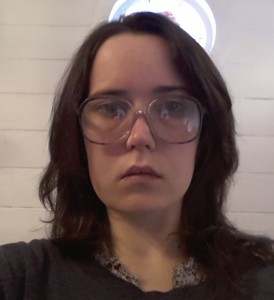 1. What inspired you to write the prose poem/microfiction which will appear in Writing To The Edge?
1. What inspired you to write the prose poem/microfiction which will appear in Writing To The Edge?
Nostalgia, mainly. I lived in Paris for six months at a bookstore, and it was one of the best times of my life. I return to it a lot in my writing, but it’s really hard to get it on paper without it sounding wrong, somehow. Like trying to describe the best piece of cake you’ve ever eaten – it’s not terribly interesting to anyone but you. So for this piece I really narrowed my focus to an hour in a day, and I think it worked okay.
2. Tell us about your process. (Do you start sparse and widen out, or do you write down every possible association and cut back? Do you research the subject matter you are writing about? Is it pure intuition?) Take us through an example if you want.
I don’t think I have a universal process – each story tends to evolve in a different way. For this piece, it started a lot broader and I really cut it back, for others the opposite has been true. I always have a clear idea, though, of what the story will focus on before I start, and I stick to that. I like to write about moments in time rather than grand narratives. I think moments are where all the action is – even if you don’t realise it at the time. So I guess my process is: I think of something that is simple and in a moment, but which contains some kind of broader meaning or ambiguity which appeals to me at the time. I write the moment down as faithfully as possible to the memory or imaginative idea, then I leave it for a while and go back to it and cut out everything that isn’t relevant to the central focus, and add some things that are, or that enhance the point. Then I leave it a bit longer, and if I don’t totally hate it I think about sending it around to mags and online journals. Then one day I get the balls to actually send it around. Then I forget about it and try to move on to the next story.
3. What advice do you have for other writers? (About the first or last line? About how to choose the title? Do you follow any rules?)
My only advice is to always let your story rest for a few days before you go back to it. Don’t write something and assume it’s done and perfect, because it never will be. That’s why editors exist and always will – there’s always room for improvement. Of course, at some point you have to let go. I guess the trick is knowing when to stop and let someone a tad more objective be your eyes.
4. Who or what inspires your writing?
I guess the common theme in my writing is the focus on setting. I like to write about where I am with as much detail as possible, because I think it says a lot about who you are – where you choose to be. At the moment I’m based in Hill End in regional NSW, and the landscape here is very inspiring. Space, quiet, rustling gum trees, things growing (or not), the different breezes every day, the kookaburra that comes to say hi most days. When I was in Paris, it was Paris that inspired me, or rather my little microcosm within the city. In Sydney, it was Sydney and the streets I’ve walked down when upset in Autumn or making bad decisions in Spring.
5. Tell us what you do if you haven’t written anything in a while and you want to get started writing again? Could you share your favourite writing exercise with our readers?
If it’s been a while and I have absolutely no ideas, I like to take a notepad and go to a café and just write as fast as I can about the people that come in, what they look like, what weird things they do, their relationship with the barista or whoever they’re with. I find if you sit for even five minutes you’ll see the most amazing things unfolding in front of you – it’s so easy to pick the guy with a heart-wrenching, hopeless crush on the waitress, or the couple who have been together way too long and secretly hate each other. What happens with this is the guy with the crush will remind me of a time I was in a similar situation, how that felt and who that was, and then I’ll start writing about that. Or the couple will remind me of some friends who just went through a breakup that was long overdue, but they couldn’t bear to end it because they didn’t want to be alone. And then I have a story.
 Kate Andrews-Day is a writer and editor-in-chief at Assemblage, an arts organisation that publishes critical discourse on contemporary art. Kate is working on her first novel about an isolated community-turned-cult in regional NSW.
Kate Andrews-Day is a writer and editor-in-chief at Assemblage, an arts organisation that publishes critical discourse on contemporary art. Kate is working on her first novel about an isolated community-turned-cult in regional NSW.
